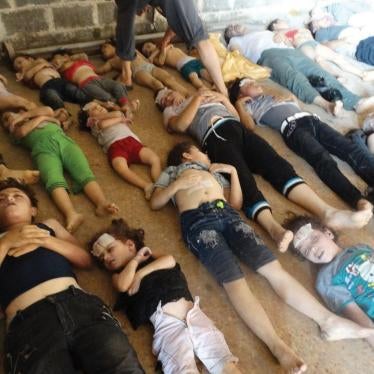Delivered on June 9, 2011 by Human Rights Watch
Human Rights Watch welcomes the report of the Libya Commission of Inquiry, which has rightly highlighted serious violations of human rights and international humanitarian law. We believe the Commission should continue its important work.
Since the beginning of anti-government protests in mid-February, the government of Muammar Gaddafi has chosen to meet the legitimate demands of Libyan citizens for civil liberties and political rights with lethal force. The government's response led directly to a protracted armed conflict that has caused great civilian harm.
Violations of the laws of war by government forces are extensive. These include indiscriminate attacks in Misrata and towns of the Nafusa mountains, including the firing of Grad rockets, into residential neighborhoods; the placing of five different types of landmines in six locations; and the use of mortar-fired cluster munitions in Misrata.
Human Rights Watch has documented a wave of arrests in Tripoli, Misrata, Zawiya and other towns of the west, with government forces detaining those who protested against the government, or are believed to have supported the protests. To date, the government has provided no information about the number of people it has arrested, where they are being held, or the charges the face, leading to concern that many individuals have been forcibly disappeared.
Evidence from those released from government custody reveals a pattern of torture, usually at the time of interrogation. Detainees have been beaten with wooden sticks and plastic pipes and subjected to electric shocks. Some apparently died from the abuse and subsequent lack of medical care.
The number of deaths from the clashes surrounding the initial protests and subsequent crackdown in the west remains unclear, again because the government refuses to provide information or free access for media and human rights groups. Libyan and foreign journalists have been detained, and in some cases physically abused.
On the rebel side, violations have also occurred. Human Rights Watch documented the arbitrary arrests of dozens of civilians who are suspected of supporting Muammar Gaddafi. Opposition forces in Libya's east and parts of the west have failed to provide these people with access to a lawyer or a chance to challenge their detention before an independent judicial authority. The opposition should also rein in the many private security groups that sprang up after the dissolution of the Gaddafi government in late February, arresting suspected Gaddafi supporters, sometimes using excessive force. In at least one case, one of these groups apparently tortured a detainee to death.
At the same time, Human Rights Watch welcomes the National Transitional Council's stated commitment to abide by international humanitarian law, to cooperate with the International Criminal Court, and to foreswear the use of antipersonnel and antivehicle landmines.
To date, NATO forces seem to have taken adequate care to avoid civilian casualties in their bombing campaign, but it should do more to protect the civilians who are fleeing the conflict, in particular the thousands of sub-Saharan Africans who have left Libya for southern Europe by boat. More than 1,500 people have reportedly drowned or are missing. European governments should implement more effective mechanisms for rescue at sea. An investigation is needed into allegations that military vessels in the Mediterranean observed and failed to save a drifting boat in late March and early April, resulting in 63 deaths. EU member states should also increase quotas for refugee resettlement.
For all serious violations during the conflict, accountability is required, through both domestic mechanisms and the International Criminal Court. Those who perpetrated or ordered unlawful attacks or serious human rights violations should be punished.
We welcome the Council's attention to the dire human rights conditions in Libya and urge member states to work for the protection of civilians in the conflict and the long-term promotion of human rights. Towards that end, we support an extension of the Commission on Inquiry's mandate.
Thank you.






